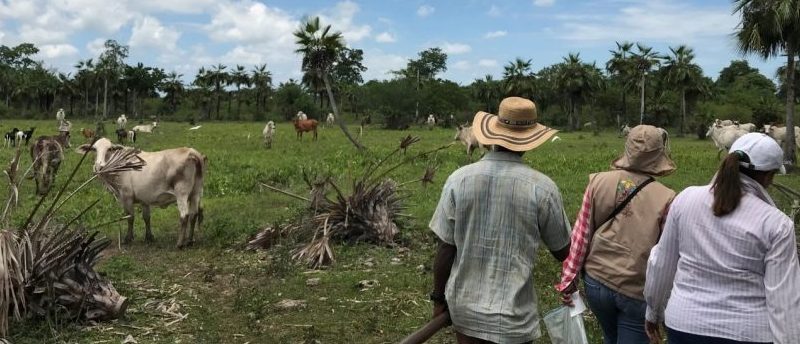Addressing Human Security and Cultivating Innovation
Addressing Human Security & Cultivating Innovation: An analysis of the unique challenges facing victims of land displacement in Colombia in their return to rural livelihoods & the structure of government aid intended to ensure their future success.
by Ekow Edzie
Note: Some names and identifying details have been changed to protect the privacy of individuals
Between 1985 and 2012 more than five million Colombians were forcibly displaced from the land they occupied due to the conflict between the Colombian government, guerrilla groups – most notably the FARC –and paramilitary groups.[1] The armed conflict caused more than 220,000 killings, of which 80% were civilian victims.[2] Additionally, 27,000 people were kidnapped while many others suffered from the frequent use of child soldiers and widespread sexual violence that accompanied the armed conflict.[3] In 2011, the government of Juan Manuel Santos created law 1448: The Victims and Land Restitution Law, which provided legal and institutional support for displaced victims of the armed conflict to return to their land.
The judicial and administrative phases of Colombia’s land restitution program confer official land title to successful land restitution claimants. At the conclusion of these processes, many land restitution beneficiaries receive support from the Colombian government and international aid organizations to establish productive agriculture on their restituted land. At this juncture, however, the land restitution beneficiary must confront obstacles that both encompass and significantly transcend the realm of agriculture. The land restitution beneficiary must navigate acute threats of violence, cope with poverty, collaborate with neighbors, manage psychological trauma and learn the agricultural methods that will be productive in the near term and in the drought-prone future.
On July 11th, 2018 I accompanied a staff member of the Colombian government’s Land Restitution Unit –hereafter referred to as the LRU—on the 165-mile drive from Santa Marta, a coastal historic city in the north of Colombia, to Chibolo, a remote inland town surrounded by immense expanses of grasslands. Liliana, the LRU professional, oversees the design of the agricultural projects that land restitution beneficiaries in the state of Magdalena receive in rulings by the state’s restitution judge
We departed Santa Marta in the pre-dawn darkness in a white 4×4 pickup that the LRU contracts for restitution field visits. I sat in the backseat of the truck, next to a box of a dozen or so large folders, each containing the legal documents of a distinct restitution case. Liliana turned on the GPS unit that allows the central LRU office in Bogota to track the whereabouts of staff on field visits and Joaquin, the driver, focused on the winding roads that rise from the coast, over the foothills, into the central plains of Magdalena.
Five hours later we arrived in Chibolo. The last leg of our trip was at a crawl of a pace. The roads were unpaved, with large divets and ruts that Joaquin had to take in first gear; the truck’s transmission whined and sputtered.
We met a restitution claimant named Pablo, who led us along a path through shoulder-high grasses. Joaquin stayed by the truck. The path ended at a gate which opened to a wide clearing—the plot that Pablo had won the title to in the restitution court. At the gate, a large man in a tattered t-shirt leaned cross-armed. He was flanked by what seemed to be his entire family: a woman, three children, and two other men.
Pablo asked the cross-armed man to let us pass so that Liliana might complete her tasks. The man refused. Pablo pleaded in a soft-spoken, mild-mannered fashion. The man in our way was visibly distraught—eyes red and watering. His wife took out her phone and recorded the interaction, with a child in her other arm. “We didn’t push anyone off this land,” the man said. Pablo pleaded with him again to let us pass.
Liliana, clearly unnerved by the situation, turned around and told me that we were leaving.
Back at the truck, she chided Pablo for not having handled this situation before she arrived. He was going to have to manage this on his own, she said. Apparently, the LRU, accompanied by Colombian police, had already forcibly removed the family in question from his land. The man’s father had been complicit in the displacement of Pablo’s family a generation ago, one of the ‘testaferos’ or figureheads that paramilitary leaders hired as titleholders to lands that were forcibly taken for the paramilitary’s benefit. After this forced eviction, Pablo let the family return to continue living on the land in interim, before the completion of his agricultural project.
We left Pablo with the group of men at the crossroad, climbed back into the truck and drove to meet the next land restitution claimant on Liliana’s list .
The anecdote that I provided above is meant to provide the reader with a snapshot of the complexity of the political economy of land restitution in Colombia. Within the state of Magdalena, where my field research was focused, there is a diverse set of stakeholders with distinct motivations—colored by the ubiquitous forces of history, memory, and power—all operating within the sprawling reach of Law 1448 towards a mission that is by many estimates unachievable.
Ekow is a recent graduate of the Fletcher School, where he concentrated in development economics and land governance. In the summer after his first year at Fletcher, Ekow received a Switzer Fellowship to conduct field research on the land restitution process in Colombia. Prior to Fletcher, Ekow worked with the international education firm EF Education First, where he managed partnerships between EF and non-profits operating across Latin America. Ekow served with the U.S. Peace Corps in the Dominican Republic and is a graduate of Middlebury College, where he studied environmental science and biology.
[1] Amnesty International. A Land Title is Not Enough: Ensuring Sustainable Land Restitution in Colombia. (London: Amnesty International Ltd., 2014), 9.
[2] Ibid, 9.
[3] Ibid, 9.

